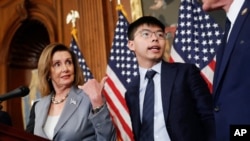China's Foreign Ministry accused U.S. lawmakers Thursday of meddling in the country's affairs after the legislators invited Hong Kong pro-democracy activists to testify on Capitol Hill.
China's Foreign Ministry spokesman Geng Shuang said House Speaker Nancy Pelosi and other American lawmakers overreached their authority by engaging with what he termed Hong Kong separatists.
"We urge the U.S. to stop bolstering radical violent forces in Hong Kong that advocate Hong Kong independence, and stop intensifying words and actions that undermine the prosperity and stability of Hong Kong,'' he said at a daily briefing in Beijing.
On Tuesday, prominent Hong Kong activist Joshua Wong urged U.S. lawmakers to support human rights and democracy in the semi-autonomous Chinese territory, declaring, "The stakes have never been higher."
Wong's appeal for U.S. support came during testimony at a hearing in Washington before the Congressional Executive Commission on China to review developments in Hong Kong, and China's role in the political crisis there.
Wong was joined by Hong Kong celebrity activist Denise Ho, who warned that an erosion of the city's unique status would embolden China if the U.S. does not put pressure on Beijing and support U.S. legislation aimed at defending Hong Kongers' civil rights.
The 79-year-old Pelosi has monitored China from her early years in Congress, when she appeared with other lawmakers in Beijing's Tiananmen Square to pay tribute to protesters who died in 1989 pro-democracy protests.
U.S. lawmakers will move next week to begin passing legislation aimed at combating human rights abuses in Hong Kong, an action intended to send long-term support to democracy activists there.
If passed, the bill would allow President Donald Trump to use the Magnitsky Act to sanction Hong Kong and Chinese authorities for human rights abuses, while ensuring protesters are not denied entry visas to the United States, and that Hong Kong is complying with U.S. sanctions and laws.
Protests aimed at promoting democracy in the Chinese territory have continued, despite the Hong Kong government's promise to withdraw extradition legislation that sparked protests. Dissenters have since broadened their demands for the direct election of their leaders and police accountability.
The protesters viewed the bill that would have allowed some Hong Kong criminal suspects to be extradited to mainland China for trial as an example of the erosion of Hong Kong's autonomy since the former British colony was returned to China in 1997.
More than 1,300 people have been arrested since the demonstrations began in early June.
The increasingly violent demonstrations have damaged Hong Kong's economy, which already had been weakened by the reciprocal tariff increases imposed by Trump and his Chinese counterpart, Xi Jinping, as the world's two largest economies try to negotiate a new trade agreement. More talks are set for October in Washington.





